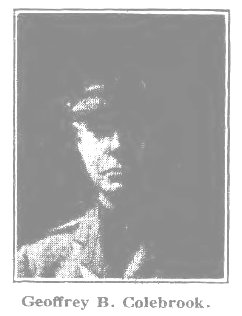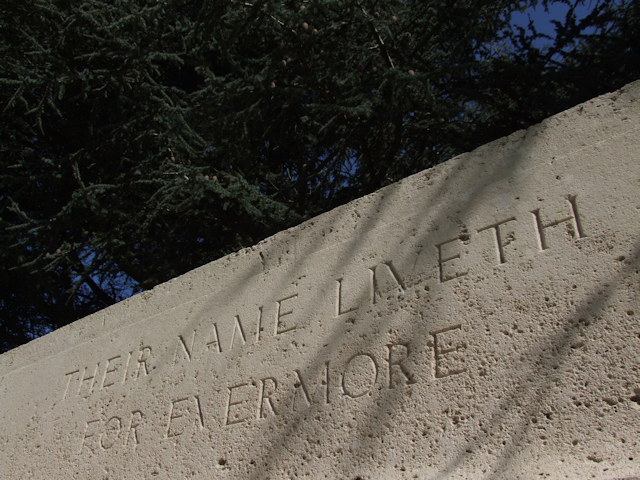Name
Geoffrey Bathurst Colebrook
Conflict
First World War
Date of Death / Age
26/07/1915
19
Rank, Service Number & Service Details
Second Lieutenant
The Queen's (Royal West Surrey Regiment)
1st Bn.
Awards: Service Medals/Honour Awards
Cemetery/Memorial: Name/Reference/Country
WOBURN ABBEY CEMETERY, CUINCHY
I. D. 10.
France
Headstone Inscription
Not Researched
UK & Other Memorials
Not on the St Albans memorials
Pre War
Eldest son of Albert Ernest and Janet Colebrook, of "Greystones", Highwood Hill, London. Born in St Albans on the 26th July 1896.
Geoffrey was educated at Hildersham House, Broadstairs (Snowden's) and Rugby.
Wartime Service
He obtained a temporary commission as 2nd Lieutenant in the 5th Middlesex on the 15th of August 1914 and went to France in December, attached to the 1st West Surrey Regt., in which he received a regular commission on the 17th of March 1915.
Geoffrey was killed in action at Cuinchy on the 26th if July 1915.
His name and picture appear in De Ruvigny’s Roll of Honour, tributes to Geoffrey listed in the entry read:
"Lieut.-Col. Heath, 2nd Battn. (since killed), wrote to Col. Wilkins, 1st Battn. : "I am more sorry than you can think to see the announcement in the papers that Colebrook has been killed. He was as fine a type of youngster in every way as one could wish for, and would have gone a long way had he lived. Esdaile, in whose company he was, tells me, he was the most efficient Platoon Commander for his age he has ever come across. It is bad luck, and I wonder how it happened. You have been unlucky in both losing Colebrook and Armitage, and I am most awfully sorry, for they were such splendid fellows." and Capt. Boyd: "His loss will be greatly felt by us all here, and our sympathies are with you and yours. When he obtained a commission into this battalion we were all very much pleased, as we had grown to know him by that time, and to realize what a capable and good chap he was. Perhaps you would like me to give you the details of how he met his end. He was up in the front-line trenches when one of those high-velocity shells, known to us as 'whiz-bangs' came over. They never give one any warning like other shells do, and your son, who was standing outside the dug-out, was killed instantaneously by a shrapnel bullet in the head. It is some comfort to know that his end came swiftly and painlessly, which is what we all hope for if our turn should come. He was brought down to the dressing station for the remainder of the night and morning of next day. At 3.30 p.m. on the 27th, he was buried jus beside Battalion Headquarters, in a small cemetery which is used by the troops for that particular area. We were able to obtain a Padre from the Field Ambulance to take the service, and a party of your son's own platoon were able to attend, together with all the officers of his company and as many others of us as could be spared from their duties."
His Captain, writing six months later, said: "During the few months I had the privilege of knowing and serving with your boy, I soon found out that in spite of his extreme youth, he was a born leader of men, and absolutely without any sense of fear. I had peculiar opportunities during February and part of March, when we were engaged in difficult and sometimes dangerous work, of noting his bearing and temperament, and he simply amazed me by his coolness and contempt of danger in unpleasant situations. I could trust him anywhere to do anything, and his men loved him, and, what is more, realized his worth." and Segt.-Major Reid, an old veteran of 23 years' service, who was his Platoon Sergt., wrote to his wife: "All the men have been terribly upset by the loss of our Platoon Commander. He was much a brave little fellow, and was so loved by all that there was not a man but would have gladly given his life to have saved him. He was a plucky one."
Mr. H. C. Bradby, his House Master, wrote: "I think of him like the froth on a wave as a small boy in the House XV. attempting to stem an onrush of forwards of twice his size and weight. It was characteristic of him. He rejoiced in action. It makes me very sad to think that he will never come back to tell us laconically that it was 'pretty beastly' or 'fairly decent."
While at Rugby he was Captain of the school running eight; winner of the "brick" run in 1914, and also very fond of ski-running."
Acknowledgments
Derry Warners
Jonty Wild



